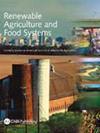Motivating organic farmers to adopt practices that support the pest-suppressive microbiome relies on understanding their beliefs
IF 2
3区 农林科学
Q2 AGRICULTURE, MULTIDISCIPLINARY
引用次数: 0
Abstract
Certified organic farming is a suite of regulated practices that can support social, economic, and ecological sustainability in agriculture. Despite the standardization and regulation of certifying bodies, practices adopted by organic farmers vary with potential heterogeneous effects on environmental outcomes. While it is accepted that beliefs can enable or constrain the adoption of farming practices, it remains unclear if variation in organic farmer beliefs mediates observed heterogeneity in practices and the ecology of farms. Communities of soil microorganisms that induce plant resistance and regulate insect herbivores offer a lens to explore the relationship between beliefs and practice adoption. Variation in insect herbivores across organic farms is common but none have studied the role of farmer beliefs in regulating pests through the soil microbiome. Herein, we hypothesized that variation in adoption of microbiome-supportive practices by organic farmers is driven by heterogeneity in their microbiome beliefs. We also investigate the importance of demographic variables and farm characteristics, compared to farmer beliefs, for adoption of practices that support the microbiome. To test our hypothesis, we surveyed the microbiome beliefs, farming practices, and motivations of 85 organic farmers in New York State, USA. We used affinity propagation to cluster farmers by their beliefs, and statistical models to evaluate variation in farming practice adoption and farmer motivations. Our survey received a 30.5% response rate, most organic farmers (≈96%) believed the soil microbiome was important for supporting plant defenses and reducing pests, and <16% believed their farming practices were unimportant for promoting beneficial microbiomes. Seven clusters of farmers were identified that varied in their microbiome beliefs. Among the clusters ≈42% of farmers believed on-farm management and external factors (e.g., climate change) were important for promoting the microbiome. These farmers used fewer pesticides and synthetic mulches, more pre-planting practices (e.g., solarization), and were more motivated to adopt new practices to support the microbiome than their peers. The most important factors motivating adoption were reductions in pests, increased yields, and biodiversity benefits. Beliefs, demographics, and farm characteristics (e.g., time in organic management) were correlated with similar suites of farming practices, but only beliefs predicted farmer motivations. Our study suggests beliefs are key to understanding farmer motivations and promoting organic farming system sustainability via the pest-suppressive microbiome. More broadly, we suggest the need for socio-ecological approaches that account for farmer beliefs when studying the adoption of conservation practices in agroecosystems.要激励有机农民采用支持抑制害虫的微生物群的做法,就必须了解他们的信念
经认证的有机耕作是一套受监管的做法,可支持农业的社会、经济和生态可持续性。尽管有认证机构的标准化和监管,但有机农户采用的做法各不相同,可能对环境结果产生不同的影响。虽然人们已经认识到,信念可以促进或限制农业实践的采用,但有机农户信念的差异是否会介导所观察到的实践和农场生态的异质性,目前仍不清楚。诱导植物抗性和调节昆虫食草动物的土壤微生物群落为探索信念与实践采用之间的关系提供了一个视角。有机农场中昆虫食草动物的差异很常见,但还没有人研究过农场主的信念在通过土壤微生物群调节害虫方面的作用。在此,我们假设有机农场主采用微生物组支持性实践的差异是由其微生物组信念的异质性驱动的。与农民的信念相比,我们还调查了人口统计学变量和农场特征对采用支持微生物组的方法的重要性。为了验证我们的假设,我们调查了美国纽约州 85 位有机农场主的微生物组信念、农业实践和动机。我们使用亲和力传播法根据农民的信念对他们进行聚类,并使用统计模型来评估耕作方法的采用和农民动机的变化。我们的调查得到了 30.5% 的回应,大多数有机农户(≈96%)认为土壤微生物群对支持植物防御和减少虫害很重要,<16% 的农户认为他们的耕作方法对促进有益微生物群不重要。研究发现,有七个农民群组在微生物群信念方面存在差异。在这些群组中,≈42%的农民认为农场管理和外部因素(如气候变化)对促进微生物群很重要。这些农民使用较少的杀虫剂和合成地膜,采用更多的播种前措施(如日晒),与其他农民相比,他们采用新措施支持微生物群的积极性更高。促使农民采用新方法的最重要因素是减少虫害、提高产量和生物多样性效益。信念、人口统计学和农场特征(如有机管理时间)与类似的耕作实践套件相关,但只有信念能预测农民的动机。我们的研究表明,信念是理解农民动机和通过害虫抑制微生物组促进有机农业系统可持续性的关键。更广泛地说,我们认为在研究农业生态系统中保护措施的采用时,需要采用考虑农民信念的社会生态学方法。
本文章由计算机程序翻译,如有差异,请以英文原文为准。
求助全文
约1分钟内获得全文
求助全文
来源期刊

Renewable Agriculture and Food Systems
农林科学-农业综合
CiteScore
5.20
自引率
7.40%
发文量
39
审稿时长
>36 weeks
期刊介绍:
Renewable Agriculture and Food Systems (formerly American Journal of Alternative Agriculture) is a multi-disciplinary journal which focuses on the science that underpins economically, environmentally, and socially sustainable approaches to agriculture and food production. The journal publishes original research and review articles on the economic, ecological, and environmental impacts of agriculture; the effective use of renewable resources and biodiversity in agro-ecosystems; and the technological and sociological implications of sustainable food systems. It also contains a discussion forum, which presents lively discussions on new and provocative topics.
 求助内容:
求助内容: 应助结果提醒方式:
应助结果提醒方式:


